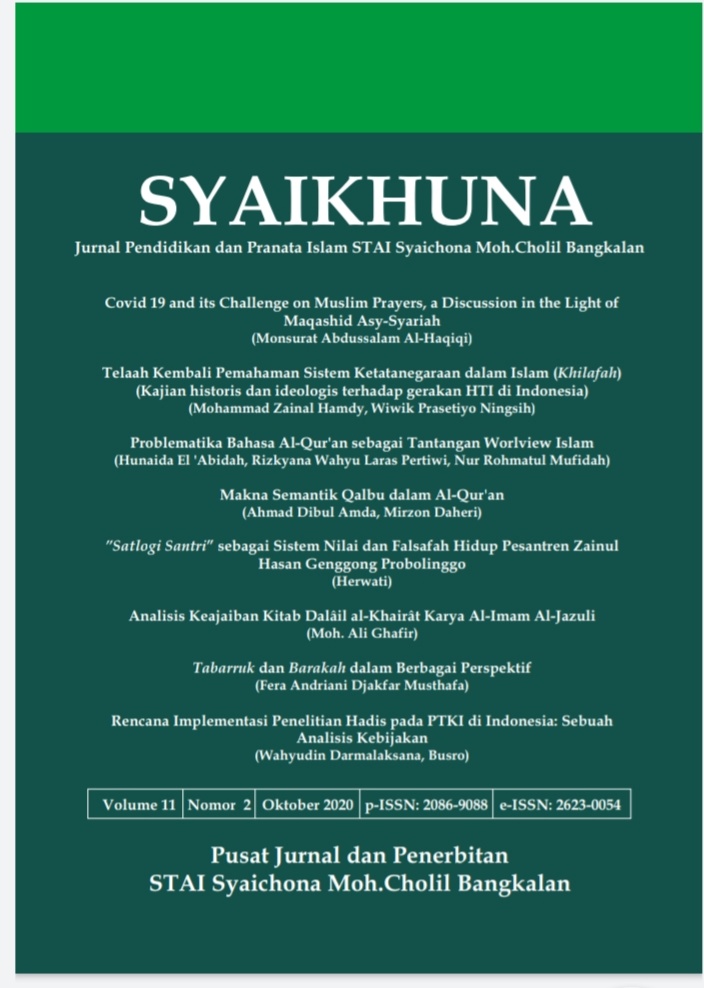Telaah Kembali Pemahaman tentang Sistem Ketatanegaraan dalam Islam (Khilafah)
(Kajian historis dan ideologis terhadap gerakan HTI di Indonesia)
DOI:
https://doi.org/10.36835/syaikhuna.v11i2.4013Keywords:
HTI, Khilafah, Ideology, HistoryAbstract
History records that the government referred to by HTI is not in accordance with history, what was the form of government at the time of the Prophet and Khulafa ar-Rasidiin. In history, it is explained that the Prophet did not establish or establish a definite or absolute form of government, because the form of government is also not only a human relationship with God, but also a relationship with humans. In this case ideologically, Islam only provides a frame or limitations or can be called an indicator of goodness in government. The form of government can be adjusted according to the needs and benefit of the people.For example, the difference between the election of a caliph during the time of Abu Bakr, Umar, Usman and Ali, during the time of Abu Bakr, Abu Bakr was chosen by acclamation by representatives of the Muhajirin and Anshor from the results of deliberations and discussions. In contrast to the election of Umar to become Caliph, at that time Umar was appointed directly by Abu Bakr, also to Ustman who was appointed by the formation team for the election of the caliph and also Ali. All these differences are caused by differences and needs at that time. And these differences do not violate al-quran and as-sunnah. So it can be concluded that the echo about returning the caliphate system to the present is an inaccurate resonance, especially to the point of forbidding the existing system and infidel people who use the system, namely the democratic system.References
Abdullah, A. 2001. Mafahim Hizbut Tahrir. Jakarta: Hizbut Tahrir Indonesia.
Abdullah, Kurniawan. 2003. Gerakan Politik Islam Ekstraparlementer: Studi Kasus Hizbut TahrÃr Indonesiaâ€. (Tesis, UI).
Adhayanto, Oksep. “Khilafah dalam Sistem Pemerintahan Islam, “Jurnal Ilmu Politik dan Ilmu Pemerintahan.â€
Al-Mawardi, Imam. 2015. Ahkam Sulthaniyah. Jakarta: Qisthi Press.
Departemen Agama Republik Indonesia, Al-Quran dan Terjemahnya.
Dhiyauddin Umari, Akram. 1999. Masyarakat Madani. Jakarta: Gema Insani Press.
Muhammad, Herry dkk. 2006. Tokoh-Tokoh Islam Yang Berpengaruh Abad 20. Jakarta: Gema Insani.
Zulfadi, Z. 1010. Infiltrasi Gerakan Hizbut Tahrir di Yogyakarta. Tesis, UIN Sunan Kalijaga.
Rahim, Abd. Khalifah dan Khilafah Menurut Al-Qur’an. Hunafa: Jurnal Studi Islamika.
Najib, F., & Humaidi, H. (2020, 24 Maret). Nasionalisme Dalam Al-Qur'an (Analisis Kontektual Abdullah Saeed). Al-Insyiroh: Jurnal Studi Keislaman , 6 (1), 70-83. -83. https://doi.org/https://doi.org/10.35309/
alinsyiroh.v6i1.3817
Sjadzali, Munawir. 1993. Islam dan Tata Negara. Jakarta: UI-Pres.
Sudrajat, Ajat. 2011 Khilafah Islamiyah dalam Perspektif Sejarah. Yogyakarta: Universitas Negeri Yogyakarta.
Sumarni, S. 2008. Makna Ruh dalam Eksistensi Manusia, Studi Atas Pandangan Taqiyuddin An-Nabhani. Skripsi, UIN Sunan Kalijaga.
Abdullah, Kurniawan. 2003. Gerakan Politik Islam Ekstraparlementer: Studi Kasus Hizbut TahrÃr Indonesiaâ€. (Tesis, UI).
Adhayanto, Oksep. “Khilafah dalam Sistem Pemerintahan Islam, “Jurnal Ilmu Politik dan Ilmu Pemerintahan.â€
Al-Mawardi, Imam. 2015. Ahkam Sulthaniyah. Jakarta: Qisthi Press.
Departemen Agama Republik Indonesia, Al-Quran dan Terjemahnya.
Dhiyauddin Umari, Akram. 1999. Masyarakat Madani. Jakarta: Gema Insani Press.
Muhammad, Herry dkk. 2006. Tokoh-Tokoh Islam Yang Berpengaruh Abad 20. Jakarta: Gema Insani.
Zulfadi, Z. 1010. Infiltrasi Gerakan Hizbut Tahrir di Yogyakarta. Tesis, UIN Sunan Kalijaga.
Rahim, Abd. Khalifah dan Khilafah Menurut Al-Qur’an. Hunafa: Jurnal Studi Islamika.
Najib, F., & Humaidi, H. (2020, 24 Maret). Nasionalisme Dalam Al-Qur'an (Analisis Kontektual Abdullah Saeed). Al-Insyiroh: Jurnal Studi Keislaman , 6 (1), 70-83. -83. https://doi.org/https://doi.org/10.35309/
alinsyiroh.v6i1.3817
Sjadzali, Munawir. 1993. Islam dan Tata Negara. Jakarta: UI-Pres.
Sudrajat, Ajat. 2011 Khilafah Islamiyah dalam Perspektif Sejarah. Yogyakarta: Universitas Negeri Yogyakarta.
Sumarni, S. 2008. Makna Ruh dalam Eksistensi Manusia, Studi Atas Pandangan Taqiyuddin An-Nabhani. Skripsi, UIN Sunan Kalijaga.
Downloads
Published
2020-10-12
How to Cite
Hamdy, M. Z., & Ningsih, W. P. (2020). Telaah Kembali Pemahaman tentang Sistem Ketatanegaraan dalam Islam (Khilafah): (Kajian historis dan ideologis terhadap gerakan HTI di Indonesia). Syaikhuna: Jurnal Pendidikan Dan Pranata Islam, 11(2), 158–172. https://doi.org/10.36835/syaikhuna.v11i2.4013
Issue
Section
Articles





